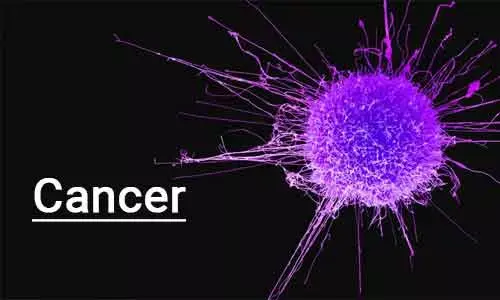- Home
- Medical news & Guidelines
- Anesthesiology
- Cardiology and CTVS
- Critical Care
- Dentistry
- Dermatology
- Diabetes and Endocrinology
- ENT
- Gastroenterology
- Medicine
- Nephrology
- Neurology
- Obstretics-Gynaecology
- Oncology
- Ophthalmology
- Orthopaedics
- Pediatrics-Neonatology
- Psychiatry
- Pulmonology
- Radiology
- Surgery
- Urology
- Laboratory Medicine
- Diet
- Nursing
- Paramedical
- Physiotherapy
- Health news
- Fact Check
- Bone Health Fact Check
- Brain Health Fact Check
- Cancer Related Fact Check
- Child Care Fact Check
- Dental and oral health fact check
- Diabetes and metabolic health fact check
- Diet and Nutrition Fact Check
- Eye and ENT Care Fact Check
- Fitness fact check
- Gut health fact check
- Heart health fact check
- Kidney health fact check
- Medical education fact check
- Men's health fact check
- Respiratory fact check
- Skin and hair care fact check
- Vaccine and Immunization fact check
- Women's health fact check
- AYUSH
- State News
- Andaman and Nicobar Islands
- Andhra Pradesh
- Arunachal Pradesh
- Assam
- Bihar
- Chandigarh
- Chattisgarh
- Dadra and Nagar Haveli
- Daman and Diu
- Delhi
- Goa
- Gujarat
- Haryana
- Himachal Pradesh
- Jammu & Kashmir
- Jharkhand
- Karnataka
- Kerala
- Ladakh
- Lakshadweep
- Madhya Pradesh
- Maharashtra
- Manipur
- Meghalaya
- Mizoram
- Nagaland
- Odisha
- Puducherry
- Punjab
- Rajasthan
- Sikkim
- Tamil Nadu
- Telangana
- Tripura
- Uttar Pradesh
- Uttrakhand
- West Bengal
- Medical Education
- Industry
Experimental drug Quisinostat may help prevent cancer relapse

Researchers at the Francis Crick Institute have identified a drug that is well-tolerated in patients and prevents cancer coming back in animal studies.
One of the biggest challenges in cancer research is preventing cancer returning in patients who have already had treatment. A reason for these relapses is that some cancer cells survive and are able to grow into a new tumour.
As part of the study published in Nature Communications, researchers showed that an experimental drug, Quisinostat, could stop tumour re-growth after initial treatment in live mice, and prevent expansion of surviving human cancer cells in culture.
The drug works by increasing the amount of a protein called histone H1.0 within the tumour cells. This protein stops the cancer cells from replicating and so the tumour from growing.
When the team tested the drug on tumours in mice, it halted tumour growth. And, when it was tested on cells taken from patients with breast, lung or pancreatic cancer, the cancerous cells were trapped in a non-dividing state.
The researchers hope that if proven to be effective in further tests and clinical trials, this drug could be given to patients after treatment to prevent any cancerous cells left behind from driving disease relapse. Importantly, the effect of Quisinostat does not depend on how cancer cells survived treatment, something that varies from patient to patient, and across cancer types, and could have a potentially broad therapeutic benefit.
Cristina Morales Torres, lead author and Principal Laboratory Research Scientist in the Cancer Epigenetics Laboratory at the Crick, says: "This drug works by disabling the cells that fuel long-term cancer growth and drive disease relapse. These early findings even suggest it may be more effective than commonly used drugs that inhibit tumour growth.
"Further research is still needed to confirm whether this drug could prevent cancer coming back in people or if it could be used to control someone's disease long term."
Importantly, this early work also suggests that Quisionostat could impact cancerous cells while leaving healthy cells unharmed.
Paola Scaffidi, co-author and Group Leader of the Cancer Epigenetics Laboratory at the Crick and Professorial Research Associate at the UCL Cancer Institute, says: "Just like stem cells that continuously produce progeny to keep our normal tissues healthy, cancer cells grow, divide and use energy. That's why finding a potential drug that halts tumour growth without hurting normal cells has been a challenge. Excitingly, with Quisinostat, we've seen no harm to healthy stem cells in our initial studies."
The next step for these researchers will be to understand why Quisinostat has a different effect on healthy and malignant cells and whether histone H1.0 can tell us what makes a cancer cell distinct from a stem cell.
for further references log on to:
Dr Kamal Kant Kohli-MBBS, DTCD- a chest specialist with more than 30 years of practice and a flair for writing clinical articles, Dr Kamal Kant Kohli joined Medical Dialogues as a Chief Editor of Medical News. Besides writing articles, as an editor, he proofreads and verifies all the medical content published on Medical Dialogues including those coming from journals, studies,medical conferences,guidelines etc. Email: drkohli@medicaldialogues.in. Contact no. 011-43720751


